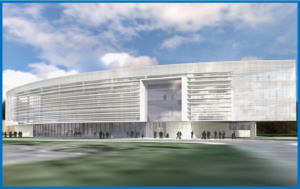 Ford and the University of Michigan are trying to accelerate autonomous vehicle research and development with a deal that embeds Ford researchers and engineers into a new state-of-the-art robotics laboratory on the U-M Ann Arbor campus. Although the new robotics laboratory opens in 2020, by the end 2016 Ford said it will move a dozen researchers into the North Campus Research Complex (NCRC).
Ford and the University of Michigan are trying to accelerate autonomous vehicle research and development with a deal that embeds Ford researchers and engineers into a new state-of-the-art robotics laboratory on the U-M Ann Arbor campus. Although the new robotics laboratory opens in 2020, by the end 2016 Ford said it will move a dozen researchers into the North Campus Research Complex (NCRC).
The announcement is the latest in a series of actions by Ford as it moves toward having fully autonomous SAE-defined level 4-capable vehicles available for high-volume commercial use in 2021. Autonomous vehicles are part of Ford’s expansion to be an auto and a mobility company, a common industry goal.
The Ford autonomous car will lack a steering wheel or gas and brake pedals. It is being specifically designed for commercial mobility services, such as ride-sharing or ride-hailing, and will be available in high volumes. Ford is investing in or collaborating with four startups to enhance its autonomous vehicle development. (See Society of Automotive Engineers-rated level 4-capable vehicle)
“Ford engineers and researchers will begin working shoulder-to-shoulder with U-M faculty and students to test and learn about autonomous vehicle technology and innovation,” said Mark Fields, Ford president and CEO.
Ten years into the Ford-University of Michigan Innovation Alliance, the two parties have agreed Ford will lease the fourth floor of the new robotics laboratory. It is a 140,000-square-foot building on Hayward Street, east of the university’s Space Research Building.
The planned robotics laboratory will have space where machines walk, fly, drive and swim. The building will house labs, offices and classrooms, continuing a tradition of robotics leadership at U-M that includes the creation of MABEL, the world’s fastest-running robot with knees.
By ultimately locating a team of more than 100 employees on campus, Ford said it benefits from being close to technical leaders as well as facilities, such as Mcity – an urban simulation test environment in Ann Arbor.
Ford has been testing autonomous vehicles for more than 10 years. Last fall it claimed to be the first automaker to begin testing at Mcity. Ford is also tripling its fleet of autonomous research vehicles this year. Ford claims its fully autonomous vehicle fleet is the largest of all automakers.
New Leadership at U-M
Ford and U-M also said that professors Matthew Johnson-Roberson and Ram Vasudevan will serve as leaders of a new autonomous vehicle research team comprising graduate students, postdoctoral fellows and researchers. Both professors began collaborating with Ford earlier this summer. Dr. Johnson-Roberson is an assistant professor of Naval Architecture and Marine Engineering. He has worked in autonomous vehicles since the first DARPA Grand Challenge in 2004. His research focuses on robotic systems perception. Dr. Vasudevan is an assistant professor of Mechanical Engineering with a background in robotics and next-generation automotive technologies.
“We’re at the point where you are beginning to see the positive impact driverless cars could have on people’s lives,” said Vasudevan. “Sometimes, the challenge for us as professors and engineers is knowing what the relevant research problems are that need to be addressed to guarantee the success of autonomous vehicles. Working closely with Ford gives us the data and equipment to better understand and resolve the challenges that lie ahead.”
U-M’s College of Engineering also named Professor Jessy Grizzle as Director of Robotics. Dr. Grizzle also serves as the key liaison between Ford’s autonomous vehicle research program and the College of Engineering. A U-M professor of engineering since 1987, Grizzle has spent nearly two decades as a Ford consultant working on programs such as environmentally friendly emissions, enhanced fuel economy and hybrid-electric vehicles.
“Ford is the University of Michigan’s deepest and most engaged industry partner,” said Professor Alec Gallimore, the Robert J. Vlasic Dean of Engineering. “As leaders in the fields of robotics and transportation, we’re excited to grow our partnership at a time – and place – in which these sectors are converging.”
U-M is one of only a handful of universities to offer master’s and doctoral degrees in robotics, with the Ph.D. program now in its third year. More than 35 faculty members work in the field.

